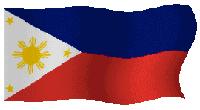
The
Philippines, officially known as the
Republic of the Philippines, is a country in Southeast Asia with Manila as its capital city. It comprises 7,107 islands in the
western Pacific Ocean.
The Philippines is the world's 12th most populous country, with a population of about 90 million people. Its national economy is the 46th largest in the world, with an estimated 2008 gross domestic product (GDP) of over US$ 327.2 billion (PPP). There are more than 11 million overseas Filipinos worldwide, about 11% of the total population of the Philippines.
The Philippines constitutes an archipelago of 7,107 islands with a total land area of approximately 300,000 square kilometers (116,000 square miles).
A former colony of Spain, and the United States, the Philippines is one of two predominantly Roman Catholic countries in Asia, the other being East Timor. There are also a number of minority religious groups, including Islam, Buddhism, and Hinduism. Multiple ethnicities, and cultures are found throughout the islands. Ecologically, the Philippines is one of the most diverse countries in the world.
NOW LETS HAVE THE
TOP FIVE BEST THINGS TO KNOW ABOUT PHILIPPINES
TOP 5 THING TO KNOW ABOUT PHILIPPINES
"PHILIPPINE TRIVIA"

"THE ERUPTION OF MT. PINATUBO"
Mount Pinatubo is an active stratovolcano located on the island of Luzon, at the intersection of the borders of the Philippine provinces of Zambales, Tarlac, and Pampanga.
The volcano's ultra-Plinian eruption in June 1991 produced the second largest terrestrial eruption of the 20th century (after the 1912 eruption of Novarupta) and the largest eruption in living memory.the effects of the eruption were felt worldwide. It ejected roughly 10 billion metric tonnes (10 cubic kilometres) of magma, and 20 million tons of SO2, bringing vast quantities of minerals and metals to the surface environment. It injected large amounts of aerosols into the stratosphere—more than any eruption since that of Krakatoa in 1883. Over the following months, the aerosols formed a global layer of sulfuric acid haze. Global temperatures dropped by about 0.5 °C (0.9 °F), and ozone depletion temporarily increased substantially.
"THE PHILIPPINE FLAG"


Philippine Flag is an exceptional Flag.The Philippine Flag is the only flag in the world that is displayed upside-down when the country is in war(red on top and blue at the bottom)
TOP 4 THINGS TO KNOW ABOUT PHILIPPINES
"WORLD'S LARGEST"

The largest pearl known, was found in the Philippines in 1934. It is a naturally-occurring, non-nacreous, calcareous concretion from a giant clam. Because it did not grow in a pearl oyster it is not pearly, instead it has a porcellaneous surface. In other words, it is glossy like a china plate. Other pearls from giant clams are known to exist, but this is a particularly large one. The pearl weighs 14 lb (6.4 kg) and was supposedly first discovered by an anonymous Filipino Muslim diver off the island of Palawan in 1934. According to the legend as it is currently told, a Palawan chieftain gave the pearl to Wilbur Dowell Cobb in 1936 as a gift for having saved the life of his son. The pearl had been named the "Pearl of Allah" by the Muslim tribal chief, because it resembled a turbaned head. Another even more elaborate legend says that this object is actually the Pearl of Lao-Tzu, a cultured pearl created with a carved amulet and then supposedly progressively grafted into several giant clams, before supposedly being lost due to a shipwreck in 1745.
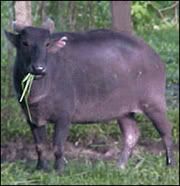
Largest Endangered Animal
People used to call Mindoro as the "Land of the Tamaraws". About 10,000 heads of these unique pygmy water buffalos were roaming around the island-province of Mindoro in the 1900s. But that was a century ago. Today, the Tamaraws in the province are in danger of extinction, and Mindoro might lose the symbol that it once proudly introduced to the world.
The Tamaraw, scientifically known as Bubalus mindorensis, is endemic to Mindoro. Belonging to the family of buffalos, the same categorical group of the Philippine carabao, the Tamaraw is the largest endangered land animal in the Philippines today. In 1996, the International Union for the Conservation of Nature (IUCN) listed it as one of the ten most endangered species in the world.
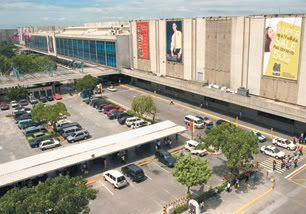

SM City North EDSA is the first SM Supermall operated by SM Prime Holdings, which is the largest retail and mall operator in the Philippines. SM City North Edsa is the largest mall in the Philippines and the second largest in the world, having a gross floor area of 425,000 square meters.
Construction of SM City North EDSA started in 1983 and opened in 1985. Since then, the shopping mall has undergone several expansions and renovations. It features SM Department Store, The flagship SM Supermarket, a bowling alley, a food court, a Sky Garden, an entertainment stage for events, a 12-cinema complex, a Hypermarket, and 820 specialty shops and restaurants. In 2006, Ayala Malls constructed TriNoma, a shopping mall across North Avenue from SM City North EDSA, and created significant market competition. Currently, the SM mall is undergoing a redevelopment plan that will see the opening of the Sky Garden in 2009, an IMAX theater and other amenities.
The mall attracts almost 1.3 million visitors on weekends, and 450,000 - 600,000 visitors on weekdays.
TOP 3 THINGS TO KNOW ABOUT PHILPPINES
"WORLD SMALLEST"

Taal Volcano is a stratovolcano on the island of Luzon in the Philippines. It is situated between the towns of Talisay and San Nicolas in Batangas.Taal volcano was considered as the smallest volcano in the world It consists of an island in Lake Taal, which is situated within a caldera formed by an earlier, very powerful eruption. It is located about 50 km (31 Miles) from the capital, Manila. It is one of the active volcanoes in the Philippines, all part of the Pacific ring of fire. The volcano has a water-filled crater and sits on an island in the center of Taal Lake, which geologists believe is an ancient caldera.


World's Smallest Fish
The world's smallest freshwater fish is found in the Philippines. The dwarf goby (Pandaka pygmaea) measures 1.2 centimeters or less than half of an inch, the tiniest known vertebrate. American Ichthyologist Albert Herre first discovered it in Malabon River in 1925.
The Philippines is also the home of sinarapan, the world's smallest commercial fish. Sinarapan, scientifically known as Mistichthys luzonensis, is a goby found only in Lakes Bato and Buhi in Camarines Sur province. Sinarapan grows to an average length of 1.25 centimeters, only slightly longer than the dwarf goby. Today, unabated fishing in the two lakes threatens the population of sinarapan.

World's Smallest Hoofed Mammal
South of Palawan, lies the Balabac Island, home of the world's smallest hoofed mammal - the Philippine mouse deer. Locally known as Pilandok (Tragalus nigricans), this ruminant stands only about 40 centimeters at the shoulder level.
In other countries, it is called chevrotain, or simply mouse deer. Contrary to its name, pilandok is not a member of the deer family. It belongs to the family Tragulidae in the mammalian order Artiodactyla. The male species has no antlers like those of a real deer. Instead, it uses its large tusk-like canine teeth on its upper jaw for self-defense; in the same way a deer uses its antlers.
TOP 2 THINGS TO KNOW ABOUT PHILIPPINES
"BEACHES AND SEAS"

"Puerto Galera"
This coastal town is well known among tourists for its numerous pocket beaches and many snorkeling and Scuba diving spots. The area was designated a Man and Biosphere Reserve of UNESCO in 1973 and has some of the most diverse coral reef diving in Asia. The marine environment has benefited in recent years from the influx of tourist dollars. This has seen a huge reduction in the number of fishermen in the area, as they gain higher revenue from tourists.
Puerto Galera is a listed by the
Club of the Most Beautiful Bays In The World, and is the only bay in the Philippines to be listed there.
 Boracay
Boracayis a tropical island located approximately 315km (200 miles) south of Manila and 2km off the northwest tip of the island of
Panay in the Western Visayas region of the Philippines. It is one of the country's most popular tourist destinations. The island comprises the barangays of Manoc-Manoc, Balabag, and Yapak (3 of the 17 barangays which make up the municipality of Malay), and is under the administrative control of the Philippine Tourism Authority in coordination with the Provincial Government of
Aklan.
 Tubbataha Reef
Tubbataha Reef is an atoll coral reef located in the Sulu Sea of the Philippines. It is a marine sanctuary protected as Tubbataha Reef National Marine Park. It is nominated at the New
7 Wonders of Nature.
There are no permanent inhabitants of the islets or reefs. Fishermen visit the area seasonally, establishing shelters on the islets. The park is visited by tourists, particularly divers. Trips to Tubbattaha from mid-March to mid-June are all vessel-based; the park is about twelve hours by boat from Puerto Princesa City. Tubbataha is considered as the best dive site in the Philippines and the diving dedicated ships that operate during the "Tubbataha Season" are usually booked years in advance especially during the Asian holidays of Easter and "Golden Week".
Tubbataha has become a popular site for seasoned sports divers because of its coral "walls" where the shallow coral reef abruptly ends giving way to great depths. These "walls" are not only wonderful diving spots but they are also wonderful habitats for many colonies of fish. There are
giant jacks,
hammerhead sharks,
barracudas,
manta rays, palm-sized
Moorish idols, [parrot fishes], and
moray eels living in the sanctuary. Tubbataha is even home to the hawksbill sea turtles (
Eretmochelys imbricata) which are endangered species
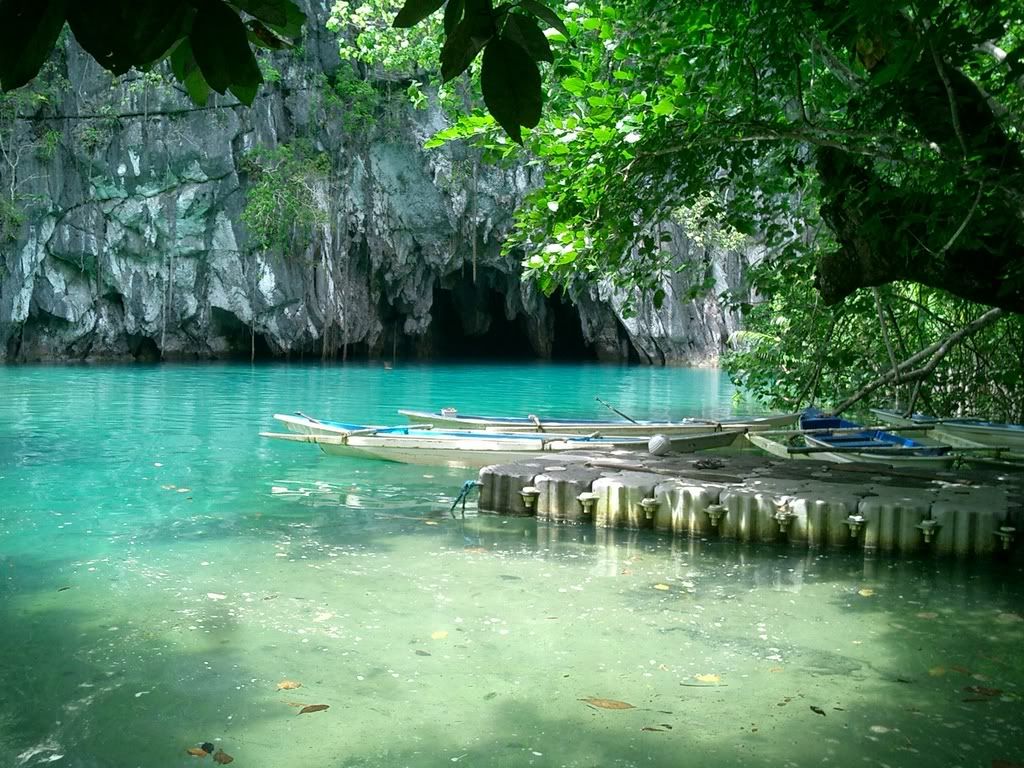
The City of Puerto Princesa (Filipino: Lungsod ng Puerto Princesa), the capital of Palawan, is a first class city in the Philippines. According to the 2007 census, it has a population of 210,508 people in 33,306 households. It is famous for its crocodile farms, underground rivers and dive spots. It is also the largest city in the Philippines in terms of total land area.
The Puerto Princesa Subterranean River National Park, a UNESCO World Heritage Site, features a spectacular limestone karst landscape with its underground river. A distinguishing feature of the river is that it flows directly into the sea, and the lower portion of the river is subject to tidal influences. The area also represents a significant habitat for biodiversity conservation. The site contains a full mountain to the sea ecosystem and protects forests, which are among the most significant in Asia.
THE BEST THINGS TO KNOW ABOUT PHILIPPINES
"LAND MARKS"

The Banaue Rice Terraces are 2000-year old terraces that were carved into the mountains of Ifugao in the Philippines by ancestors of the Batad indigenous people. The Rice Terraces are commonly referred to by Filipinos as the "Eighth Wonder of the World".[1][2][3] It is commonly thought that the terraces were built with minimal equipment, largely by hand. The terraces are located approximately 1500 meters (5000 ft) above sea level and cover 10,360 square kilometers (about 4000 square miles) of mountainside. They are fed by an ancient irrigation system from the rainforests above the terraces. It is said that if the steps are put end to end it would encircle half the globe.
The Banaue terraces are part of the
Rice Terraces of the Philippine Cordilleras, ancient sprawling man-made structures from 2,000 to 6,000 years old. They are found in the provinces of Apayao, Benguet, Mountain Province and Ifugao, and are a
UNESCO World Heritage Site

The Chocolate Hills is an unusual geological formation in Bohol, Philippines. It is composed of around 1,268 perfectly cone-shaped hills of about the same size, spread over an area of more than 50 square kilometres (20 sq mi). They are covered in green grass that turns brown during the dry season, hence the name.
The Chocolate Hills are a famous tourist attraction of Bohol. It is featured in the provincial flag and seal to symbolize the abundance of natural attraction in the province. It is in the Philippine Tourism Authority's list of tourist destinations in the Philippines; it has been declared the country's 3rd National Geological Monument and proposed for inclusion in the UNESCO World Heritage List

Mayon Volcano, also known as Mount Mayon, is an active stratovolcano in the province of Albay, in the Bicol Region, on the island of Luzon, in the Philippines.
Renowned as the "Perfect Cone" because of its almost perfectly conical shape, Mayon is situated 15 kilometres northwest of Legazpi City."This is said to be the most beautiful volcano in the world.
THANKS GUYS HOPE YOU ENJOYED IT
"my next special portion will give prior to anime.I know most of you are not familiar with it but let me give you ways and a brief intro for them and find out how interesting they are"
HAVE A GREAT DAY AND HAPPY BLOGGING!!
FIRST COMMENTER:
![[HL-cam2.jpg]](https://blogger.googleusercontent.com/img/b/R29vZ2xl/AVvXsEhoeUNnpXblXU8OREtcP6dAqXMPfn-_kWTfHqZ8k-xEJPk23MtdDfqFOoMExnL9Y6ELbc2ITofXeOsj9dWsbp84iuIWMzhhlSapZrw11_r3riRzprVxzP3hBx_BWAfqm1ECjgXIfEuxJgyc/s220/HL-cam2.jpg)
LYNN OF my so called life
THANKS!!


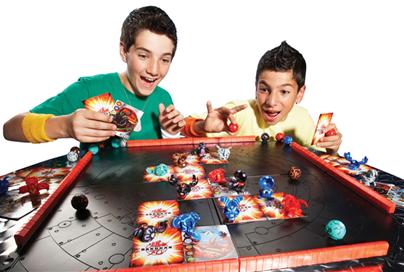












![[travelnorm-125x125.jpg]](https://blogger.googleusercontent.com/img/b/R29vZ2xl/AVvXsEiJr6bomed84bVWVsd38ZJUjAjekRReAyAyFo9l13VcydKjvEeazpnWHCnOxBfmEDXUUANTjlnMZHjutdnjlFxPp69oMNL9UGVcTKDUjQKiq9EZb9ZFfWutWL9B7kD49YjaTdfz2RNYiMM/s220/travelnorm-125x125.jpg)













































![[HL-cam2.jpg]](https://blogger.googleusercontent.com/img/b/R29vZ2xl/AVvXsEhoeUNnpXblXU8OREtcP6dAqXMPfn-_kWTfHqZ8k-xEJPk23MtdDfqFOoMExnL9Y6ELbc2ITofXeOsj9dWsbp84iuIWMzhhlSapZrw11_r3riRzprVxzP3hBx_BWAfqm1ECjgXIfEuxJgyc/s220/HL-cam2.jpg)




